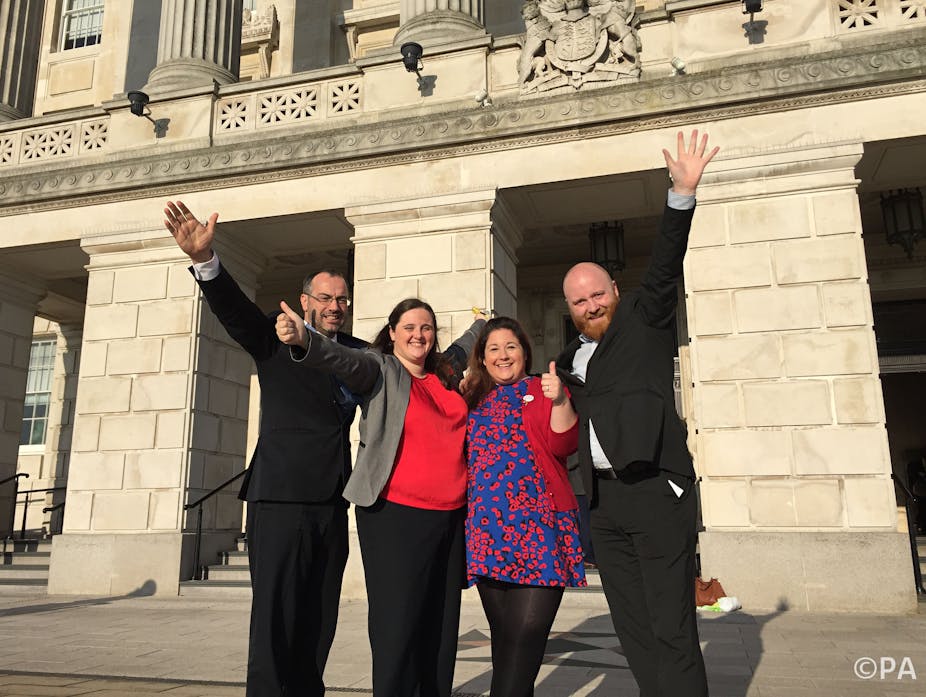Less than a week after civil marriage equality was signed into law in the Republic of Ireland, the Northern Ireland Assembly at Stormont also voted in favour – only to see the proposal vetoed by the Democratic Unionist Party (DUP).
The republic voted for equal civil marriage in a referendum in May, but north of the border – despite broad community support – the DUP was able to use a “petition of concern” to deny the will of the assembly.
The parliamentary mechanism was introduced under the Good Friday Agreement to ensure the rights of minorities in Northern Ireland. Amnesty International commented that it was ironic that a mechanism to ensure the rights of minorities had been used to deny a fundamental right to the LGBT minority in Northern Ireland.
Crossing the line
Since the first proposal to introduce equal civil marriage to the Northern Ireland statute books in 2012, the annual motion has been making a relatively steady climb towards a majority in favour. On November 2 the Northern Ireland Assembly reached that majority with 50.48% – or 53 of 105 members voting in favour – the largest to vote on the topic to date.
The voting patterns largely followed the party lines with the nationalist parties, Sinn Fein and the SDLP, driving the surge. But it was a combined effort with the majority of Members of the Northern Ireland Assembly (MLAs) from the Alliance Party, independents, Green Party and a few isolated unionists that tipped it over the line.
This is a historic and long-overdue success that came sooner than anticipated. It is also one that was stopped in its tracks by the staunchly anti-equal civil marriage DUP, the largest unionist party.
Under the Good Friday Agreement 1998 arrangements were to be made to “ensure key decisions are taken on a cross-community basis”. Consequently, the petition of concern was introduced and which allows for 30 or more MLAs to veto a proposed motion. Once vetoed, for the proposed legislation to pass it must be supported by a weighted majority (that is 60% of the voting members), including at least 40% of the nationalists and unionists voting.
Taking advantage of the lack of a weighted majority and its hold over the unionist vote, the DUP made use of this mechanism. This means that equal civil marriage cannot and, under the current status quo, will not pass by political vote, despite the overall majority of MLAs and 68% of those they represent being in favour.
The petition of concern is one of a number of safeguards to “ensure that all sections of the community can participate and work together successfully” and that “all sections of the community are protected” under the Good Friday Agreement.

Need for reform
The use of the petition of concern has in the past been criticised and allegations have been made that this mechanism is being used by larger parties (such as the DUP) to promote their own interests, at the expense of the majority’s – an argument that seems to be on the mark in this instance.
It has also been claimed that the mechanism has been misused to block decisions that have nothing to do with vital interests specific to the nationalist or unionist communities. This rings true on the issue of equal civil marriage, which has to do with equality on the basis of sexuality, not political leanings.
In March 2014 the Northern Ireland Assembly set up a review committee to consider the petition of concern. Three reforms were tabled for consideration – to introduce an alternative procedure (such as a weighted majority vote); to restrict the use of petitions of concern to key areas; or to adjust the current threshold of 30 signatures. The conclusions reached by the committee were inconclusive and no reforms were made on the basis of a lack of consent.
One thing that was clear from the comments of the MLAs and academics that responded is that there is a lot of discontent about the increasing use of the petition of concern and the way in which this mechanism is used.
A further issue is politicians playing both sides against the middle and engaging in petty mudslinging in the process – Mike Nesbitt, the leader of the Ulster Unionists, blamed the DUP for his abstention is one example. In such a close vote as this, an abstention is as good as a no vote and leaves the petition of concern open to abuse.
In the current climate, equal civil marriage is unlikely to be introduced by politics alone. However, this historic vote is not wasted – it provides persuasive evidence for the judicial review that is currently before the Northern Ireland High Court on the issue.

